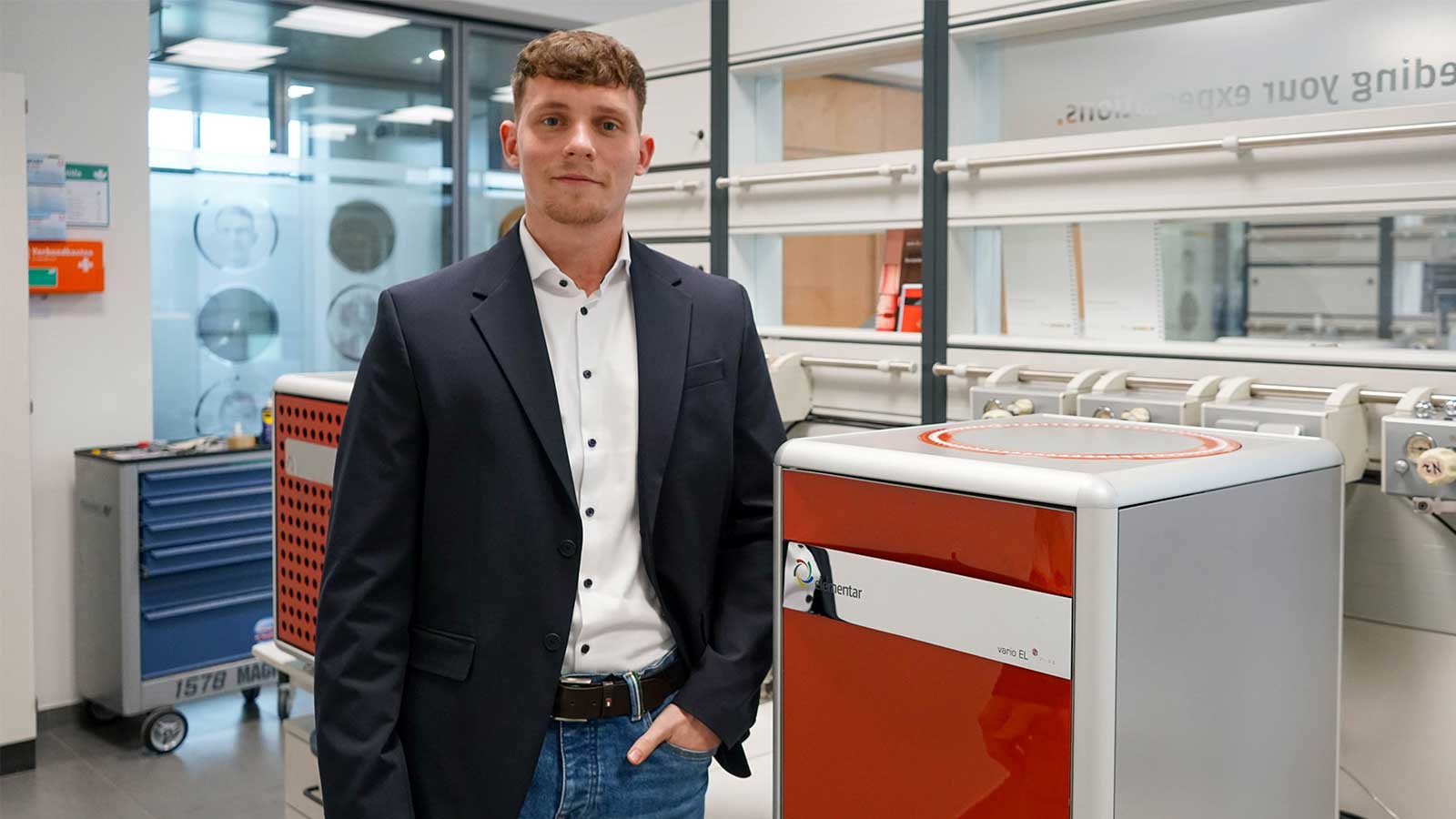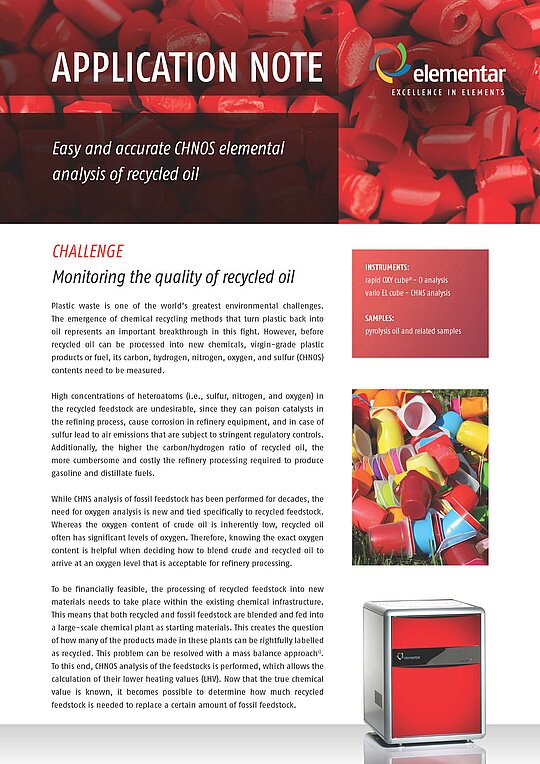Chemical recycling - How plastic waste becomes a valuable resource

The transformation from a linear to a circular economy is the solution to our plastic problem - elemental analysis plays an important role here
Plastic waste is one of the biggest environmental problems of our time. We discard millions of tons of plastic every year. This waste often ends up in our soil, groundwater and oceans in the form of microplastics - and at some point, we ingest these particles again through our food. Furthermore, plastics are predominantly made from fossil raw materials, which leads to additional CO2 emissions in the atmosphere. It is clear that we cannot do without plastics in our everyday lives. Plastics have become indispensable in medicine, electronics, mobility, and the packaging industry. So the real problem is not the material itself, but its predominantly linear use. Plastics contain valuable building blocks (hydrocarbons) that can be reused. By reusing the hydrocarbons, the use of new fossil raw materials can be avoided. Therefore, a good solution to the plastic problem is a transition to a circular economy, i.e. the complete recycling of plastic waste.
Only up to 20% of the world's plastic waste is currently recycled and kept in circulation. Recycling is mainly mechanical and usually results in a lower-quality product than plastics made from fossil resources. As a result, mechanically recycled plastics cannot be used for medical products, food packaging, and other important applications that require certain quality standards.
New recycling technologies are starting to come into play to fill these gaps. Chemical recycling is an important building block, and CHNOS elemental analysis can support chemical recycling processes for plastics and help achieve a breakthrough in a sustainable circular economy for plastic waste.
What is chemical recycling all about?
Chemical recycling comprises various processes for processing plastic waste into chemical base materials and chemical precursors. The molecular chains of the plastics (polymers or polymer chains) can be broken down using various methods: liquefaction by pyrolysis, conversion into gas, or the decomposition of the plastics into their chemical building blocks (monomers).
In recent years, thermochemical recycling (pyrolysis) has become the most promising of the chemical recycling processes. In this method, organic compounds are broken down into small molecules by literally "cooking" the plastic at high temperatures (300 °C to 700 °C) in the absence of oxygen and breaking it down into shorter hydrocarbon chains. This results in the formation of oil-like liquids (pyrolysis oil) and gas mixtures. The pyrolysis products can then be used to produce new chemicals and materials for high-quality plastics.
To ensure that the recycled oil is suitable for further processing into new chemicals, new plastic products or fuels, its content of carbon, hydrogen, nitrogen, oxygen and sulfur – or CHNOS for short - must be measured in a qualified manner. While CHNS analysis of fossil raw materials has been carried out for decades, the need for oxygen analysis is new and specific to raw material recycling. Our elemental analyzers for CHNOS analysis, such as the vario EL cube and the rapid OXY cube®, help with the important task of quality control of pyrolysis oil. Through thermal decomposition (O) or combustion (CHNS) of the pyrolysis oil, the CHNOS contents of the sample are reliably converted into the target analyte gases, which are measured with our highly sensitive detectors, so that the exact chemical composition of the recycled materials can be determined easily and quickly.
Admittedly, the chemical recycling of plastics is still in its infancy, but it is already an important building block in the transition to a circular economy and it is much more environmentally friendly than the incineration of plastic waste, which unfortunately still dominates. There are two main application areas for chemical recycling: firstly, where mechanical recycling reaches its limits, for example when the effort involved in sorting and cleaning is too great. Secondly, chemical recycling makes sense when the material has already been mechanically processed several times. If you want high-quality recycled materials, then you need chemical recycling so that the polymer can be broken down into its components and then reassembled.
We are hopeful that the further development of pyrolysis techniques will be successful, as pyrolysis is an important breakthrough on the road to a circular economy for plastics. Our elemental analyzers for CHNOS analysis play a key role in refining chemical recycling techniques and accurately assigning recycling labels to products. CHNOS analysis of pyrolysis oil can help to optimize pyrolysis technologies by providing a quick and easy way to check whether small changes lead to an even more valuable product.
In this way, we hope elemental analysis can contribute to finally getting the global plastic waste problem under control!
Find out more
Easy and accurate CHNOS elemental analysis of recycled oil

DOWNLOAD YOUR COPY
Fill in the form to receive your download link per e-mail.
Your contractual consideration for the free provision of the download is the subscription to our personalized newsletter. By clicking on the “download now” button, you therefore declare your acceptance of the receipt of personalized newsletters by e-mail by Elementar Analysensysteme GmbH and its group companiesas well as the evaluation of your user behavior in this regard and - if available - the merging of this data with your data in our customer database.
In order to receive newsletters from our group companies, it is necessary to transfer your above-mentioned personal data to these companies. We point out that these are partly located in so-called unsafe third countries outside the EU/EEA, in which no adequate level of data protection (e.g. by adequacy decision of the EU, Art. 45 GDPR) is guaranteed. In these countries, you may not be able to enforce your rights as a data subject, or only to a limited extent. In addition, it is possible that local government agencies access your data to a disproportionate extent. The data transfer is based on Art. 49 para. 1 lit. b) GDPR.
You are aware that the subscription to our personalized newsletter represents the contractual consideration that you provide for the free provision of the download. You can unsubscribe from the newsletter at any time with effect for the future. You can object to the future use of your data for advertising purposes at any time. For further information, please refer to our privacy policy.
Do not miss any new articles
NEWSLETTER
We will constantly publish new blog articles. Register for our newsletter to stay up-to-date and get informed about latest blog articles, news and trends.
